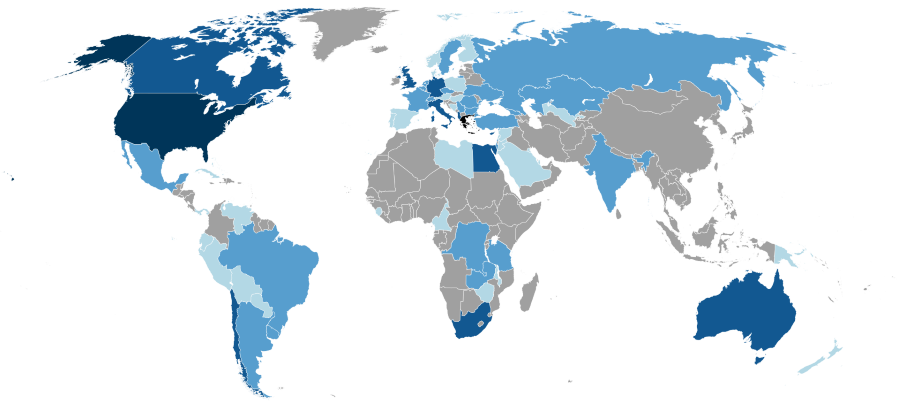A policy paper titled “Greek Diaspora in an uncertain world” written by Othon Anastasakis and Antonis Kamaras, as part of the joint research project between South East European Studies at Oxford University (SEESOX) and the Hellenic Foundation for European & Foreign Policy (ELIAMEP) highlights research opportunities, involving research centers located both in Greece and abroad, that relate to the study of the Greek diaspora & homeland relationship.
According to the paper (published in April 2021) Greece’s fiscal crisis has energized its relationship with its diaspora in the last several years, after decades of decline, as well as reshaping the diaspora itself due to the massive crisis-driven migration. The fiscal crisis generated the third largest migration wave in Greece’s bicentennial history as an independent nation-state, of close to half a million, mostly highly educated individuals, who emigrated by and large to EU countries such as Germany and the UK. As a corollary, the crisis-driven migration wave put at the top of Greece’s political agenda the ways through which the diaspora can be induced to reengage with Greece via the institution of the expatriate vote.
- The Institute for Migration and Diaspora Studies at the University of Athens that has mostly focused, in the recent past, in immigration to Greece.
- The Centre of Intercultural and Migration Studies of the University of Crete, which is under the University’s Department of Primary Education has been conducting very significant work on diaspora issues with a specific focus on education.
- The University of Macedonia, especially the Department of Balkan, Slavic & Oriental Studies has also established a commendable track record on research on brain drain prior and during the crisis and on Greeks from the Former Soviet Union.
- Scholars at the Centre of Planning and Economic Research (KEPE), published a report which comprehensively relates this research agenda to the crisis-shaped context of diaspora & homeland interactions.
- Individual scholars from other institutions, such as professor Vicky Chrysanthopoulou from University of Athens and International Relations scholars Dimitri Constas and Platias Athanassios from Panteion University, have made important contributions on such issues as the diaspora and Greece’s foreign policy and diaspora engagement at the subnational level.
- ELIAMEP has committed significantly both to the study of inmigration to Greece and to the brain drain phenomenon in Greece and South East Europe at large.
Outside Greece, South East European Studies at the University of Oxford (SEESOX) has set up the Greek Diaspora Project in 2015, a research unit which sought to relate the wider diaspora and development literature to the Greek case.
We could add tther programs focusing of diaspora studies abroad, such as The Centre for Greek Diaspora Studies (CGDS), set up within the Hellenic Institute at the University of London, the Program in Hellenic Studies at Columbia University and the Modern Greek Program at the State University of Ohio.
The paper proposes that collaborative projects jointly undertaken in Greece and abroad – such the one between SEESOX and ELIAMEP- can produce interesting multidisciplinary and comparative research on the diaspora and homeland relationship. Some examples of research subjects that can illuminate how such synergies can be very fruitful are:
- BREXIT will one way or another affect the UK’s Greek community and thus ultimately influence the latter’s interaction with Greece.
- US tax exemptions of cross-border philanthropic giving by US nationals affects the capacity of Greek-Americans to donate to institutions and causes in Greece.
- Germany’s attraction to Greek medical professionals shapes the know-how and expertise that they might be able to bring back to Greece in the future.
All these research subjects relate to the host countries of Greece’s three leading diaspora communities worldwide and could to be complemented by additional research. Importantly, University departments and research centres located in Greece, such as the ones mentioned above, possess an irreplaceable expertise if we are to enlarge our comprehension of the diaspora & homeland relationship in the fiscal crisis and post crisis era.

The papers goes on to add that as important as the comparative perspective is, it is imperative that Greek diaspora studies link up with leading research domains in Greece and indicatively, selects the five disciplinary domains where SEESOX and ELIAMEP, together with other research centres and university departments, located in Greece and abroad, can collaborate:
• In European Studies, the survey of the brain drain and gain phenomenon is inextricably connected with such issues as the EU’s freedom of movement and the debate on North-South transfers within the EU. The actual or potential impact of important diaspora communities in major EU member -countries and their relationship with Greece, such as the Greek community in Germany, also merits investigation from a European Studies perspective.
• In Security and Foreign Policy studies, the evolution of the Greek-American lobby is significant in terms of identifying sources of conduct of Greek foreign and national security policy while also being a factor that needs to be assessed in the interpretation of Turkish national security and foreign policy.
• In the study of Culture, and Religion, productive lines of inquiry can be pursued such as on Greek Orthodoxy in Greece and abroad, and how they influence each other; on values transmission from diaspora communities to Greece and vice versa; and on the state of governance of Greek language instruction abroad and its impact on the reproduction and evolution of Greek identity among diaspora communities.
• In Migration Studies, there are substantial opportunities in adding to the focus on in-migration the focus on out-migration particularly from a comparative South East European perspective, where we can build on the longstanding commitment, to Greece’s surrounding region, by Greek state university departments and research institutes.
• In Economics, well-developed research efforts on Greek export and Foreign Direct Investment-attraction underperformance can take on board the diaspora factor, in order to evaluate future trends in these two domains. Likewise, the thorough literature on Greek fiscal policy on taxes, social contributions and pensions is well-positioned to evaluate the feasibility and roadblocks on the way to a brain gain-friendly fiscal policy stance.
The opportunities for synergistic research between University centres and think tanks located in Greece and abroad, in satisfactorily addressing this crisis-driven transformation of the diaspora & homeland relationship, concludes the paper, are compelling and must be comparative and cross-disciplinary.
See also: Secretary General for Greeks Abroad and Public Diplomacy John Chrysoulakis on promoting Greece to the international public; Rethinking Greece: Yiorgos Anagnostou on Greek America, Greek American studies and the diasporic perspective as syncretism and hybridity; Rethinking Greece: Georges Prevelakis on Contemporary Hellenism as a “cultural sediment” linking Europe with the emerging multipolar world
I.L.
TAGS: MODERN GREEK STUDIES














